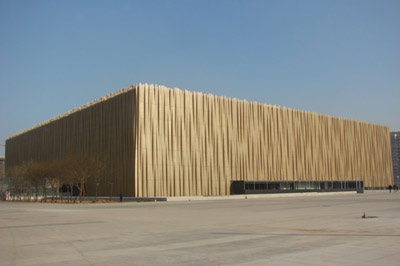With regard to the Olympic Village, Deng Yaping, the spokeswoman for the Olympic Village, announced at the end of July that individual properties would be sold as housing accommodation. The 42 apartment blocks in the village have a total floor area of 360,000 square meters. The sales price has risen from an initial 15,000 yuan/m2 (US$2200) to 30,000 yuan/ m2 (US$4400), and 70 percent of the properties have already been sold.
The Olympic Basketball Gymnasium now has a full schedule of 70 events next year.
 |
|
The Olympic Basketball Gymnasium
|
All the stadiums are trying to save money. The Bird's Nest has removed its cover, saving 300 million yuan (US$44 million), and the Olympic Basketball Stadium also reduced its capacity from 119,000 square meters to 63,000 square meters, saving 500 million yuan (US$73 million).
Post-games operation is a worldwide issue
The post-Olympic operation of stadiums is a problem faced by all host cities. The high maintenance cost of its stadiums was a setback to Nagano's economy after the Winter Olympic Games there in 1998; the same problem applied to Athens as its expensive stadiums were not easy to market or sell, and the Deputy Mayor of Athens acknowledged that the debt of the Athens Olympic Games would be paid off by several generations of Greeks.
China now has a clear idea about the operational model for the stadiums after the games, but Zhang Hengli is concerned about the commercial future of Bird's Nest. "I worry about the potential market in China. For use as an art performance venue, I think Bird's Nest has a promising future, but sports events appear more problematic. Will China be able to attract spectators to such events? The country currently doesn't have strong enough teams or major matches." It will therefore be difficult to repeat the successful business model of some foreign countries.
For the time being most of the large stadiums in China have not sold their rights, while in developed countries 70 percent have been sold. In 2000, the Texas Stadium in Houston earned US$300 million by selling its naming rights for 30 years, while the Sydney Olympic Park's Main Stadium was unable to turn a profit until it sold its naming rights to Australian telecommunication company Telstra.
There are also disagreements over the sale of the naming rights. An online blogger commented on August 20: "The Bird's Nest is a building of historical significance. It will be unacceptable to the people of China if we should sell its naming rights to make money, especially to a multinational."
Zhang Hengli said with concern: "After the issue of Starbucks in Forbidden City, we know how powerful the internet is."
(China.org.cn September 2, 2008)